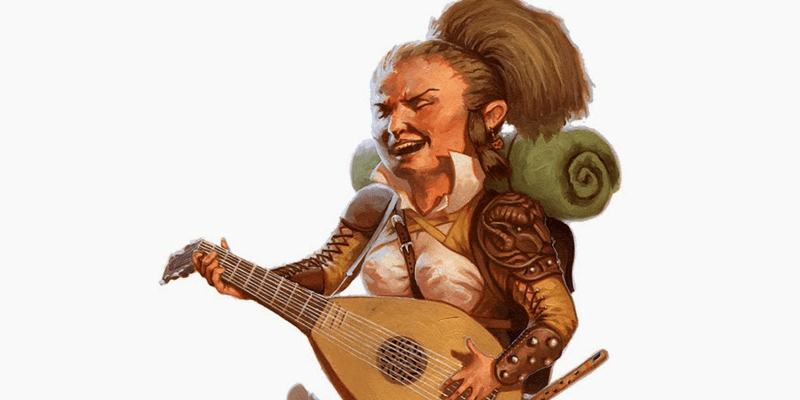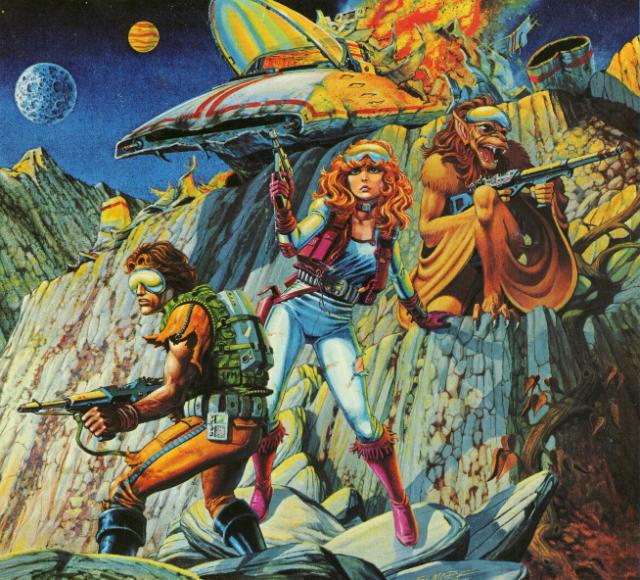The Bard Class, Part Three

Welcome back to the third post in this series on Bards. I promise that someday I will say everything I need to say about Bards and we can move on to some other class with a bizarre history across the editions, like the assassin or something. Heck, eventually I’ll even cover the classes that don’t change much, like the Core Four. (I tell a lie. They change a ton. Anyway.)
3.0 Bards
The 3.0 Bard is, I think, the origin of the widely-held mentality the Bards are a decent Fifth Beatle, but otherwise not good enough for any of the Core Four roles in an adventuring party. To be fair, looking at the 2e Bard without really crunching the numbers could give you the same impression, but with 3.0 I think it’s a much fairer criticism.
For one thing, that Class Abilities list is pitifully empty after first level. Oh, sure, there’s a casting progression, but it’s a mid-step between the casting warriors (paladins and rangers) and true spellcasters. What’s worse, Bards have a unique spell list for the first time, and it’s… kind of like a cleric who dabbles in mind-affecting magic.
Let’s go past the surface, though, and see what’s really here. Okay, the Special Abilities column is mostly empty, but that’s partly because Bardic Music is six abilities rather than one, with three options at 3 ranks of Perform (1st level), and further abilities at 6 ranks, 9 ranks, and 12 ranks. Let no one pretend there’s a single Bard who isn’t better off keeping Perform maxed out – which makes the Bard’s 4+Int skill points feel particularly stingy.
These abilities include:
- Inspire Courage, which is everything that the 2e Bard’s inspire ability did, except that it flips the OR to AND, and allows the bard to keep doing other things while inspiring allies. This is a mainstay of the Bard’s in-combat activities, but it combines poorly with their lackluster weapon-wielding abilities.
- Countersong is back, and it is both better defined and hugely more potent (when it applies, at least).
- Reading this ability now makes me think that more dungeons should have sonic-based minor debuffs, along the lines of Creepy Noises in the Distance. These would be intermittent “attacks” forcing a Will/Wisdom save, which Countersong readily handles. If I were feeling really saucy, Countersong might even flip the penalty-on-fail to bonus-on-success, on the principle that with 11 or 12 classes in the game, many parties won’t have a Bard to take advantage of this, and the ones that do should get extra-cool stuff.
- Fascinate is an AoE, out-of-combat distraction. It’s one of those cases of using a noise-making ability to help someone else’s Hide/Move Silently checks.
- Inspire Competence is another minor buffing ability. In most cases I would say that the +2 bonus isn’t worth one of the bard’s precious daily uses of Bardic Music. It’s Aid Another, but circumventing some of the obvious places where Aid Another wouldn’t work.
- Suggestion is a big deal, though the Bard may have picked it up as a spell as much as two character levels earlier. This could constitute a mighty lot o’ Suggestions in a day, if all you care to do with your power is spam Jedi mind tricks.
- Inspire Greatness is the top-end buffing power, functionally granting two temporary Fighter levels (no feat, though). There’s no question that this power is worth using, once you finally gain access to it. 2d10 + (2 x Con mod) temporary hit points, +2 attack, and a point of Fortitude save is pretty serious.
- Corner-case additional benefit: these HD count as “real” for spell resolution, so once your enemies start whipping out blasphemy – or holy word, I don’t know your life – this might be the ticket to pushing you up to the next effect category, or render you entirely immune to the effect. There aren’t many other effects in the game that can manage that.
There’s a hidden problem here: these advance by ranks of Perform, not Bard levels. (Well, you get additional targets based on Bard levels.) Which means that one level of Bard nets you the entire list, as long as you keep putting skill ranks in Perform – such as taking Rogue for the rest of your levels, because Perform is a class skill for them too.
There’s also Bardic Knowledge, which is sort of a Random Divination roll. It’s fine as long as the DM is prepared for it. Anyone here who reads the Order of the Stick recognizes that letting this just be a random roll is leaving money on the table for the DM – it’s a great chance to let a PC deliver a lot of your exposition, especially the obscure stuff that you might have a hard time justifying putting into an NPC’s mouth.
So about Bard skills and skill points. Bards have one of the most generous lists of class skills in the game, almost competing with the Rogue. That’s great! You can do almost whatever you want! But with 4 fewer skill points per level and a high demand for Cha as well as Dex that might force you to put a lesser score into Int… well, choose carefully.
One of the biggest system-side changes from 2e to 3e stands out here: a high Charisma score is actually useful. The Bard has a pretty tolerable number of spells that force saving throws, so they want to push the DC as high as possible. As I’m sure we all recall, there are no core races that grant a bonus to Charisma, while dwarves and half-orcs are all but locked out of playing bards by their Charisma penalty. Since Bards want high Charisma anyway, they can also get some abusively powerful functionality out of specializing in Charisma skills – especially Diplomacy. Impossibly high DCs? Skill Focus, 18 Cha, and maxed out skill points scoff in the face of impossibly high DCs.
The bardic spell list grants some passable healing options to go along with the mind-affecting and sonic attack spells, but they’re nowhere close to sustaining a party as the sole healer (this is 3.0 – only good or neutral clerics are really suited to the job), and none of their damaging spells are giving the 2e Bard’s fireball a run for its money. Much of the rest of the spell list has interesting, situational utility spells, especially at the top end. This shows the problem with 3.x-style spontaneous casters with Spells Known rather than a spellbook: it’s hard to justify spending a precious Spells Known slot on one of those interesting spells with a rare use case, like False Vision or Mirage Arcana, when obvious, frequent-use spells are competing for your attention (Healing Circle, Greater Dispelling). If you have to make your spell selections when you level up rather than anytime near the situation when you’d need it, you’ll have this problem; it makes sense for the Sorcerer, where that’s kind of their whole concept, but I’m not sure it’s an intrinsic part of Bard theme in the same way. Sure, they’re still dabblers in theme, but once you have six spell levels in your progression and a custom class spell list, I think we’re accepting “competent spellcaster” as an aspect of class theme.
As compared to its immediate predecessor, the 3.0 Bard doesn’t have a bizarre XP progression to shore up otherwise lackluster features. Essentially, the 2e Bard only really worked because of something that was otherwise a major flaw in the system, and when they fixed that flaw they didn’t beef up the class’s other functions enough. They can still utterly dominate social challenges, but in a way that highlights other weaknesses of 3.0’s social skills – the bard shines there at the expense of everyone else.
I suggested above that the Bard class multiclasses well with the Bardic Music ability. That’s hardly the end of the class’s multiclassing abuses – because it uses arcane spontaneous casting, it’s a favored choice for characters headed for the Arcane Archer or Dragon Disciple prestige classes. Anytime you want just a touch of arcane spellcasting, but not very much, the Bard class is probably your best bet, because it gets tasty extra skill points, and so on. The Bard isn’t as bad about egregious front-loading as the 3.0 Ranger, but the structure of Perform was an unfortunate oversight.
3.5
Okay, so the 3.0 Bard has its issues. What did 3.5 do about them? Comparatively little, especially as compared to the major overhaul of the Ranger. They pick up two more skill points per level, which is kind of a big deal for at least acknowledging the Bard as a “real” skill-driven class, and the problems I noted before with Bardic Music get fixed, even as Bardic Music gets more high-end options.
The fix to Bardic Music is obvious enough, after the fact: instead of “a bard with X ranks of Perform,” it’s “a bard of (class) level X-3 with X ranks of Perform.” The new Bardic Music options here are:
- Song of Freedom: “Old pirates, yes, they rob I”… no, wait. It’s a Break Enchantment – this is a solid expansion of the Bard’s function, and increasingly useful at higher levels. Big thumbs up here. It’s also on the Bard’s spell list, but having one spell you can safely de-prioritize is no bad thing.
- Inspire Heroics: Much like the lower-level Inspires, this is a direct bonus to stats. This one is focused on defense, granting +4 to saving throws and AC, and (this is a very big deal in 3.x) it’s the kind of AC bonus that always stacks. It’s certainly useful, though 5e has changed a lot of how I think about big numerical bonuses.
- Mass Suggestion: This improves time and usage efficiency for the lower-level Suggestion ability. It’s certainly on-theme and a reasonable high-level power, but… God help your DM, because those Fascinate saving throws are probably failing a lot of the time by this point (which happens, in 3.x, anytime you set the DC for a saving throw with a skill check, and the skill in question is the class’s number-one-with-a-bullet primary function).
- On the other hand, immunity to mind-affecting is very much on the table for NPCs at these highest levels of play, so in any encounter it’s an open question whether this will be unstoppable or useless. Screw saving throws – flip a coin.
Six times in a 20-level progression, the Bard can exchange one of her spells for something else. 3.5 shows the first creeping steps toward the more generous character-respec mechanics of 4e here, because being saddled later in your career with build choices that you regret from earlier really sucks. Good change.
The Bard spell list overall gets bulked up like whoa, which is nominally good for the class’s options and power, but also doubles down on the issues around prioritizing for spells with a common use-case and dumping rare-use spells.
In any discussion of the Bard, I would be remiss not to mention what happens when it is possible to hyper-specialize in a skill, specifically Diplomacy. Maximum skill ranks in a class skill, Charisma as an ability score you already want to be as high as possible, and one of the few cases where Skill Focus is a good feat choice: so at first level we’re talking a probable +9 to +11, depending on your Charisma bonus, with another +2 if you’re a half-elf, or if you’re a human and spent your second feat slot on Negotiator. (Hyper-specialization, remember.) That’s nice, but trivial compared to what happens at second level, when you buy your fifth skill rank in Diplomacy, Bluff, Knowledge (nobility and royalty), and Sense Motive. Okay, suddenly jumping to a conservative +16, to as high as a +20 with a high Charisma and a little help from racial benefits.
Why is this a big deal? Rational DMs surely ignore this and don’t allow for Diplomacy rolls just whenever, but one reading of the rules suggests that if you can get a word in edgewise, you might be able to roll a Diplomacy check and turn a fight with people who really hate you (Hostile) into a normal social encounter (Indifferent) on a roll of 9 or better (assuming that worst-case +16). This only gets worse as the character advances – magic items and ability score adjustments from leveling can send the Charisma bonus into the stratosphere, and Diplomacy advances steadily. I’m not checking all of my books to be sure, but I would bet there were other feats to keep on juicing Diplomacy, too.
There is a certain mythic appeal to the silver-tongued (and, presumably, radiant-browed) Bard who can talk his way out of a fight with anything that can comprehend language. On the other hand, it does a lot to make the rest of the party feel like backup singers, since the bard is presumably handling these encounters with a single skill roll.
If the DM does interpret this with maximum generosity, the bard is a more-than-ideal addition to a party, except that the rest of the party can nip off to the pub for a lot of encounters – including almost all “boss” encounters. If the DM opts for a more sensible interpretation, the Bard class as a whole leaves a lot to be desired – not resilient enough to get into melee, and with no Sneak-Attack-like damage kicker to make it worth the risk; not enough healing to be a primary healer; not enough ranged damage output with arrows or spells to fill those roles. The various Inspires are very useful, but a cleric can do roughly the same with bless and prayer. In this way, the Bard is the jack-of-all-trades but master of none, and in a small team, you’re better off with specialists than generalists.
While I don’t intend to cover the Pathfinder iteration of the bard in any detail, two of their changes deserve an honorable mention: the increase to a d8 hit die means they’re no more fragile than clerics, and Soothing Performance means they can generate healing with some of their Bardic Music uses. The other changes are great and all, but that emphasis on Bards as viable healers is the thematic change we’re going to see in 4th and 5th edition. (I won’t go so far as to draw a causal link, but this shift is nicely contemporary with the release of the Minstrel class in Lord of the Rings Online in 2007.)
In total, the 3.x Bards greatly increase the mechanical focus on performance, especially musical performance. Oratory is nominally an option, but most of the theme rests on musical instruments, and the mechanics spend a lot of time figuring out how to make a character standing some distance from the fight and playing a harp, lute, or whatever actually deal damage to monsters. In my next post, I’ll dig into the 4e bard, in which the designers grapple with that question all the more directly.



